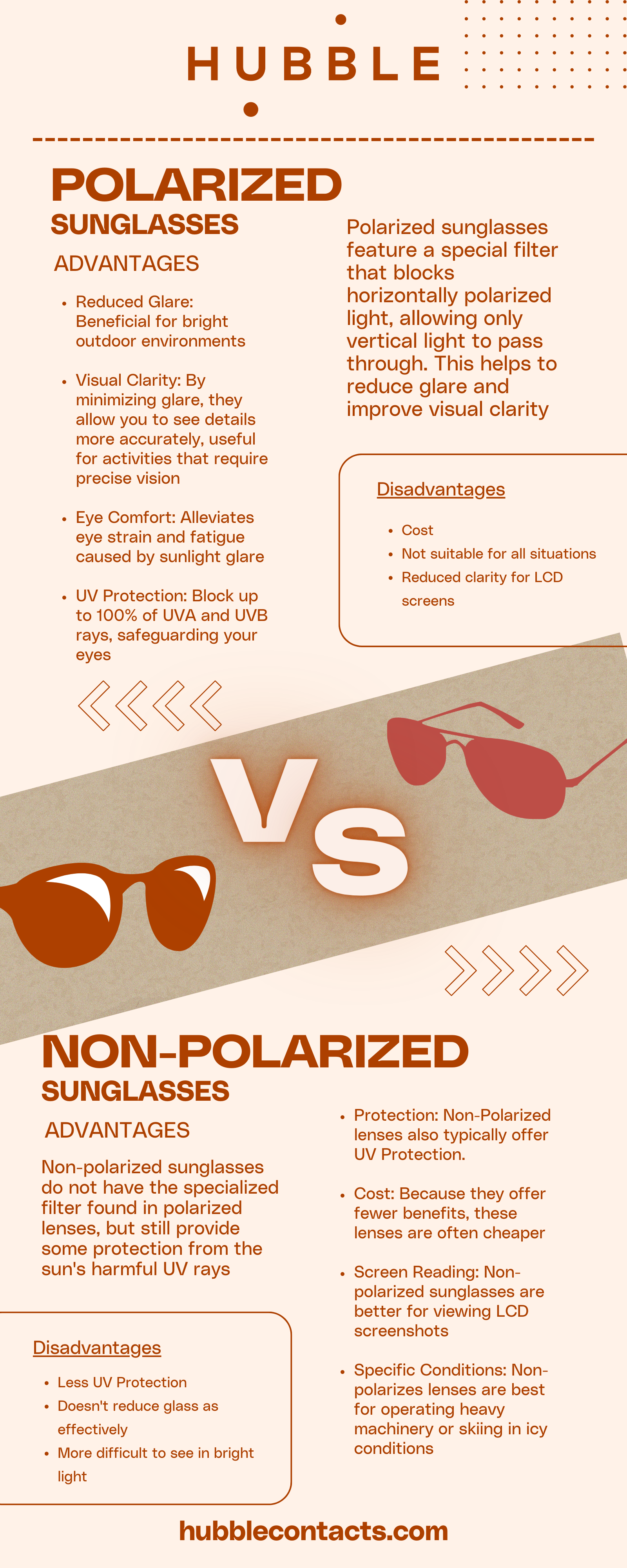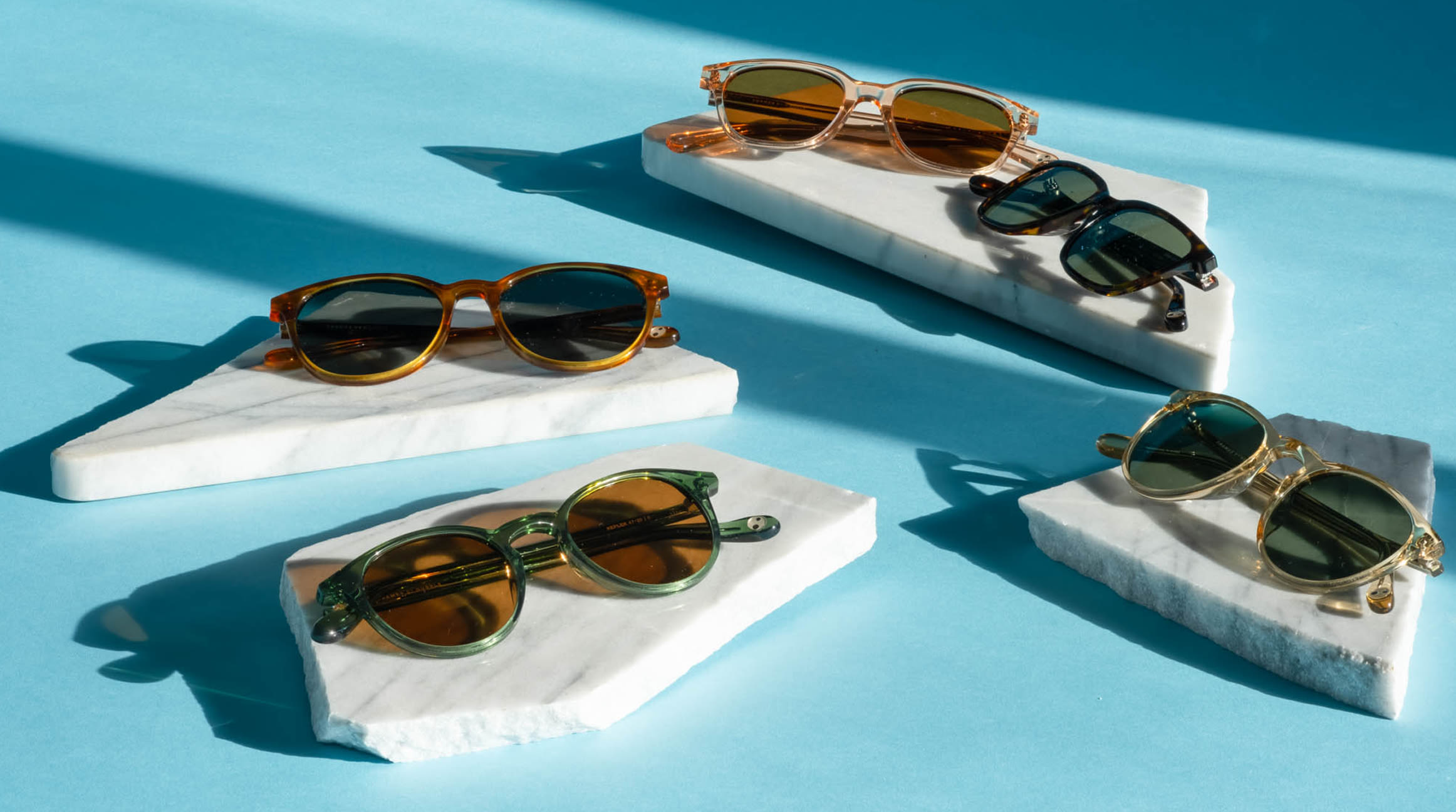Polarized vs. Non-Polarized Sunglasses

Sunglasses are more than just a fashionable accessory that provides eye protection from the brightness and overall glare of the hot sun. While you might already consider purchasing sunglasses based on your face shape , the color of the frame, or the shape of the lens, have you considered polarized vs non-polarized sunglasses?
It’s important to understand the difference between these two different types of sunglasses. Polarized and non-polarized sunglasses are two different types of eyewear designed to reduce glare and protect the eyes from harmful UV rays. Polarized sunglasses are specifically designed to reduce glare from surfaces such as water, snow, and glass. This glare occurs when light waves reflect off these surfaces and become horizontally polarized, meaning they vibrate in a horizontal direction. This type of light can create an uncomfortable glare, making it difficult to see clearly and causing eye strain.
Understanding the difference between polarized and non-polarized sunglasses is important for those who want to have the appropriate eyewear for their needs
.
What are Polarized Sunglasses?
Polarized sunglasses feature a special filter that blocks horizontally polarized light, allowing only vertical light to pass through. This helps to reduce glare and improve visual clarity, making them beneficial for activities like driving, boating, fishing, skiing, and other outdoor sports. Polarized sunglasses are also useful for individuals who are light-sensitive or have certain eye conditions, such as cataracts or macular degeneration.
What Kind of Lenses Do Sunglasses from Hubble Use?
To block out or shield harmful rays from the sun, you should wear sunglasses that offer ultraviolet (UV) protection. Hubble's sunglasses are made with polarized lenses that shut out UVA and UVB rays and reduce pesky glare. These sunglasses differ from standard tinted lenses in their superiority at blocking glare and UV rays. They block 100% of UVA and UVB rays!
Advantages of Polarized Sunglasses
Wearing polarized prescription sunglasses can be advantageous in many situations. Here are some key benefits of wearing polarized sunglasses:
- Reduced Glare - Polarized lenses effectively block horizontally polarized light, which is responsible for glare from surfaces like water, snow, and glass. By reducing glare, polarized sunglasses provide clearer vision and improved visual comfort, making them beneficial in bright outdoor environments.
- Enhanced Visual Clarity - By minimizing glare, polarized sunglasses enhance visual clarity and allow you to see details more accurately. This can be especially useful when engaging in activities that require precise vision, such as driving, fishing, skiing, and water sports.
- Improved Eye Comfort - Glare from sunlight can cause eye strain, fatigue, and discomfort. Polarized sunglasses alleviate these issues by reducing the intensity of bright light and providing a more relaxing viewing experience. This makes them ideal for long periods of outdoor activities or when exposed to intense sunlight.
- Better Color Perception - Polarized lenses can enhance color contrast and improve the perception of colors and depth. This is particularly noticeable when observing landscapes, water bodies, and natural scenery, allowing for a more vivid and enjoyable visual experience. UV Protection - Like non-polarized sunglasses, polarized sunglasses offer protection against harmful ultraviolet (UV) rays from the sun. They can block up to 100% of UVA and UVB rays, safeguarding your eyes from potential damage caused by prolonged exposure to UV radiation.
Here are some situations where polarized sunglasses are useful:
- Driving - Polarized sunglasses can enhance visibility and reduce glare from the road and other reflective surfaces, such as car windows and metal surfaces. This helps improve driving safety, especially during bright daylight or when driving on wet roads.
- Water Activities - Polarized sunglasses are quite helpful in activities like boating, fishing, and kayaking. They help reduce glare from the water’s surface, allowing you to see beneath the water and spot objects or fish more easily.
- Winter Sports - When skiing or snowboarding, polarized sunglasses can minimize the uncomfortable glare from the brightness of the snow, improving visibility and safety on the slopes.
- Beach and Outdoor Activities - Polarized sunglasses are excellent for beachgoers as they reduce glare from the sand, water, and sun. They provide a more comfortable experience for activities like sunbathing, playing beach sports, or enjoying outdoor picnics. Everyday Use - Polarized sunglasses can be worn in everyday situations where reducing glare and enhancing visual comfort are desired. They can be particularly helpful in areas with reflective surfaces, such as city environments with glass buildings or busy streets.
Disadvantages of Polarized Sunglasses
It's worth noting that while polarized sunglasses offer numerous benefits, they may not be suitable for every situation. Certain professionals like pilots who rely on instrument panels, or individuals using LCD screens may experience reduced visibility or distortion when wearing polarized lenses. Additionally, while polarized sunglasses can be helpful to reduce glare for skiers, polarized lenses have the drawback of not being able to distinguish patches of ice. In such cases, non-polarized sunglasses or specialized eyewear may be more appropriate.
Despite these specific cases, polarized lenses are a great choice for most people for everyday use. It is worth keeping in mind that polarized sunglasses can run more expensive, given their enhanced features.
What are Non-Polarized Sunglasses?
Non-polarized sunglasses do not have the specialized filter found in polarized lenses. While they still protect from the sun's harmful UV rays, they do not reduce glare as effectively as polarized sunglasses. Non-polarized sunglasses are suitable for general outdoor activities and can be a more affordable option for those who don't require specific glare reduction.
Advantages of Non-Polarized Sunglasses
Even if you do not wear prescription sunglasses every day, you will find you will still need them for general sun protection, driving during bright times of the day, enhancing an outfit, or just making a bold fashion statement. Non-polarized sunglasses can be worn in everyday situations and are more affordable than the pricier cost that comes with the upgraded visual acuity of polarized lenses.
Disadvantages of Non-Polarized Sunglasses
Non-polarized sunglasses do not have the specialized filter found in polarized lenses. While they still protect from the sun's harmful UV rays, they do not reduce glare from the snow, glass, or water as effectively as polarized sunglasses.
Polarized vs Non-Polarized Sunglasses: Which is right for you?
It's important to note that neither polarized nor non-polarized sunglasses are inherently "best" in all situations. The choice between the two depends on your specific needs, preferences, and the activities you engage in.
Polarized Lenses Use polarized lenses when you need to reduce glare, enhance visual comfort, and improve clarity in bright conditions or when dealing with reflective surfaces. They are useful for water activities, winter sports, driving, and activities in bright sunlight.
Non-Polarized Lenses Use non-polarized lenses when glare reduction is not a priority or when engaging in activities where polarized lenses may cause visibility issues. They still provide UV protection and can be suitable for general outdoor use or activities that require accurate color perception.
Ultimately, the choice between polarized and non-polarized lenses depends on your personal preferences, your lifestyle, and the conditions in which you'll be wearing the sunglasses. It can be helpful to have both options available to choose from based on your circumstances.
Polarized Prescription Glasses
You should not have to compromise your vision when deciding on prescription sunglasses. You may consider getting polarized prescription sunglasses to avoid eye strain or pain. If you drive a lot or spend any good amount of time outdoors, you will need to keep annoying glare and brightness from the sun at bay.
Polarized prescription glasses boast the benefits of prescription lenses, which correct vision problems like nearsightedness or farsightedness, and the advantages of polarized lenses, which reduce glare and improve visual clarity in bright conditions. When considering polarized prescription glasses, remember that functionality of vision correction with the ability to enhance comfort and reduce eye strain in various outdoor environments will be key.
There are several reasons why purchasing prescription lenses including polarized ones makes sense:
- Vision Correction - Prescription sunglasses are customized to address your specific vision needs. They can correct refractive errors like nearsightedness, farsightedness, and astigmatism, allowing you to see clearly and comfortably.
- Convenience - Wearing prescription glasses eliminates the need to constantly switch between regular glasses and sunglasses. With prescription glasses, you have a single pair of eyewear that corrects your vision and provides glare reduction all in one, making it convenient and efficient for outdoor activities.
- Eye Protection - Prescription lenses offer protection against harmful UV rays from the sun. Prolonged exposure to UV radiation can contribute to various eye conditions, including cataracts and macular degeneration. Polarized prescription glasses help shield your eyes from UV rays while enhancing visual comfort, ensuring both eye health and clarity.
How Can You Tell If Sunglasses Are Polarized?
There are a couple of cool and unique ways to test if lenses are polarized. It’s very simple too – you only need to hold the glasses in front of you and look at a reflective surface, such as a glass window or a car windshield. Rotate the glasses at a 90-degree angle while observing the reflection. If the lenses are polarized, you should notice a significant reduction in glare and reflection as you rotate them. This occurs because polarized lenses are designed to block horizontally polarized light, which is responsible for glare.
Another way to test if lenses are polarized is the LCD screen test. Using an LCD screen, such as a smartphone, tablet, or computer monitor, put on the glasses and look at the screen while tilting your head to the side. As you tilt, you may notice a darkening effect or the appearance of a rainbow pattern on the screen. This indicates the presence of a polarizing filter in the lenses.
Handcrafted Sunglasses from Hubble
When selecting sunglasses, it's crucial to consider the intended use and personal preferences. If reducing glare is a priority, especially for activities involving water or snow, polarized sunglasses are highly recommended. However, if glare reduction is not a huge concern or if you engage in activities that may be affected by polarized lenses, non-polarized sunglasses can still provide adequate UV protection.
Understanding the difference between polarized and non-polarized sunglasses is important for you to make an informed choice for your eye care needs. Whether it's reducing glare during outdoor activities or simply protecting the eyes from the sun, selecting the right type of sunglasses can greatly enhance visual comfort and eye health.
With Hubble, you can find handcrafted, high-quality affordable sunglasses that help you feel and look your most confident while protecting your vision. Starting at just $98, any pair can be customized with single-vision, non-prescription, or readers lenses! Once you decide on the sunglasses style and frames that you prefer, you'll enter your prescription information. Select your preferred lens type and frame color. After that, Hubble will take care of the rest, customizing your sunglasses to your specifications and shipping them directly to you.
You can shop both men’s and women’s styles with ease. Each pair is hand-assembled in Wisconsin and polished to order before getting shipped out with a sleek carrying case and microfiber cloth for easy toting and maintenance.
Hubble has all your vision needs covered when shopping for your next perfect pair of sunglasses!


